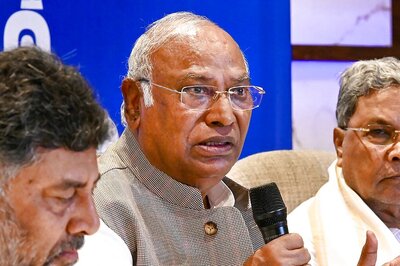
views
It’s quite ironic how humans, despite being bestowed with the benevolent gift of wit and wisdom, go against the law of nature, with blinkered eyes, knowing very well the ghastly consequences of our actions. With that as the central theme of Alia Bhatt backed Poacher, Richie Mehta carves out an impactful story, that not only keeps us hooked to the ghastly premise of the series, but symbolically quakes our conscience from within. The reeking rot that the eight episodes mini series exposes is scrupulously presented with some familiar tropes, but the ‘matter-of-fact’ treatment of each character, with respect to the narrative is quite novel and invigorating to witness.
To begin with, the detectives in Poacher don’t single-handedly pursue a notorious individual, linked to illegal poaching of Elephants in a remote, forested area of Kerala, but in hindsight, they are hell bent to put a full stop on precarious and threatening nexus comprising of those responsible for slaying more than 20 elephants, the dealers, smugglers, buyers and perhaps even the authorities embroiled in ivory trade.
The story begins with a perceptibly disturbed forest watcher, who tips off the forest officials about the horrors of elephant poaching. Burdened with guilt, he reveals a familiar name Raaz, the main person behind it all, and someone whom the authority believed was back to leading a normal life. His revelation creates a stir globally and puts the pressure on the government to crack down upon the perpetrators. And the man who takes up this task, Neel Banerjee (played by Dibyendu Bhattacharya) wastes no time and gets on with it.
We’re then introduced to the other two pivotal characters, Mala (played by Nimisha Sajayan) and Alan (Roshan Mathew). Mala is a well-recognised IFS (Indian Forest Service) officer, who is posted at an innocuous bird sanctuary. Neel, who is at the cusp of retirement and probably battling a terminal ailment, summons Mala and delegates her a task, that can possibly lead them to the rogue mastermind Raaz and his associates. Meanwhile, Alan is working with an NGO in Delhi and is adept in snake venom taxonomy. When Mala finds herself stuck in her investigation, she approaches Alan.
After thoroughly understanding the gravity of this case, Alan finds himself drawn to solving it. Even though his boss warns him about the possible, personal ramifications of tailing this investigation, Alan assures him that he would assist from the shadows, especially since the technical know-how of number crunching and data analysis is one of his fortes. With that, the trio of highly gifted individuals embark on a perilous mission that put their lives and the lives of their loved ones at stake. Whether they would succeed in unraveling the devilish and diabolical syndicate, that is more powerful and connected than one would imagine, it’s for the viewers to find out.
Richie Mehta’s Poacher takes us far away from the crime-infested nooks and crannies of concrete jungles and drops us right in the middle of wilderness, ruled by flora and fauna alike. The very first scene, a close-up of an Elephant, pacing through the gramineous forest of Kerala, the innocence in his eyes and the gunshot that pierces through his forehead makes for a bone-chilling reminder of the ecological upheaval caused by human beings. As disturbing and heart-wrenching that scene might look, it epitomizes the message behind the story brilliantly.
Poacher, just like Richie Mehta’s previous show Delhi Crime, have been made on a solid bedrock of meticulous research and exemplary details. The mini series wastes no time in establishing the backdrop of the plot and our primary characters that will be helming the story forward. The narrative itself has been composed realistically, without any unnecessary dramatic innuendos or over-the-top, inexplicable scenes. The usage of jargons, that are commonly used within the civil services network(in this case Indian Forest Service) and bureaucratic red tape adds that touch of originality to the script. While some might find these minute details intellectually discordant, others might be able to connect deeply with the premise, owing to the same aspects.
Technically, the film didn’t miss any base. The cinematography is strong and it highlights the importance of nature through vibrant shots of animals in frames. Whether it’s a lemur scuttling through the concrete roads, a hornbill perched comfortably on a branch amid the lush green canopy of a jungle or a tree frog, with obscured characters interacting in the background, the shots will definitely compel you to wonder whether they are living in our world or we are living in theirs? On top of that, like Delhi Crimes, the colour palette of Poachers is bleached out which adds intensity to the story.
Coming to the performances, Dibyendu Bhattacharya, Nimisha Sajayan and Roshan Mathew are the true stars of the show. You might have seen Dibyendu play a similar character before but the balance he brings to the character of Neel is outstanding. Nimisha Sajayan approached her character of Mala with a certain balance. Only a gifted actress like her can emote with such brilliance. Roshan Matthew impressed once again with his ability to form a deeper connection through his characters. Even the supporting actors have done their job with passion.
In the end, Poacher might not be an easy series to watch, due to its theme but people should watch it regardless. Apart from being a taut investigative thriller that unearths the rotten skeletons of the poaching industry, it subliminally makes us more conscious about our natural heritage, forests, animals, ecology and why there is a constant need to preserve and protect it. With Poacher, Richie Mehta has proved once again that he is a visionary filmmaker. Props also goes to Alia Bhatt for producing a series like this and putting forth a subject that people should be talking about.




















Comments
0 comment